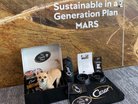Mars Advances Climate-Smart Agriculture for Pet Food Supply

Mars is part of a groundbreaking collaboration to drive climate-smart agriculture across its pet nutrition supply chains in Europe.
Teaming up with leading agricultural and sustainability organisations Cargill, Agreena, ADM, Biospheres, Horta and Soil Capital, the global company aims to accelerate the adoption of regenerative farming practices — marking a significant investment in climate resilience and sustainable food production.
The initiative aims to transition more than one million acres globally to regenerative agriculture by 2030.
Within Europe, the programme will target 20,900 hectares — an area nearly twice the size of Paris — of wheat and maize crops by 2028, introducing sustainable practices to strengthen ecosystems and mitigate climate risks.
Technology at the core of regenerative practices
Mars’ partnerships are designed to provide farmers in Poland, Hungary and the UK with financial incentives and expert guidance to implement regenerative techniques.
These methods include crop rotation, reduced tillage — minimising soil disturbance — and the use of cover crops, which are non-cash crops planted between harvests to improve soil health.
Regenerative agriculture is more than just a farming method but is a data-driven approach to climate mitigation and biodiversity restoration.
Tools such as precision irrigation, tailored fertiliser application and real-time soil monitoring are integral to the initiative.
These innovations not only increase crop yields but also reduce greenhouse gas (GHG) emissions through carbon sequestration and help restore soil health.
Deri Watkins, Regional President of Mars Pet Nutrition Europe, says: “At Mars, we know businesses like ours play a key role in securing a sustainable future for pet food.
"Healthy soil is the backbone of a resilient food system.
“Through these partnerships, we’re extremely proud to be playing our part in driving regenerative agriculture practices across Europe, restoring soil health, cutting carbon and building a stronger and more sustainable supply chain for farmers and future generations of pets and pet parents”
The impact of soil health
Central to the programme is the recognition of soil as a vital resource for climate resilience.
Mars’ initiatives will focus on improving soil health to unlock benefits such as:
- Climate mitigation: Healthy soil stores carbon, reducing GHG emissions and lessening the need for chemical fertilisers
- Biodiversity: Soil supports billions of organisms, forming the foundation of ecosystems
- Water management: Soil acts as a natural filter and helps regulate water flow
- Food security: By improving soil fertility, crops become more resilient to disease, pests, and extreme weather
- Resilience to climate extremes: Healthy soil is less susceptible to erosion, flooding and droughts, ensuring long-term productivity.
Country-specific initiatives
Mars’ climate-smart agricultural programme is tailored to the unique needs of each region, with a focus on technological innovation and measurable outcomes
- Poland
- Cargill RegenConnect will enable farmers to receive payments for carbon sequestration through regenerative practices, targeting 4,600 hectares by 2026
- Mars and ADM will transition 4,000 hectares of wheat farms to regenerative methods over five years, focusing on erosion control, carbon storage and soil health improvement
- Hungary
- Horta will equip farmers with precision tools to optimise irrigation, fertilisation and cover cropping. More than 3,600 hectares of wheat and maize crops will be transitioned by 2026
- Biospheres and Agreena will implement grower-focused programmes to improve soil health and carbon sequestration on 5,500 hectares of farmland. Farmers will receive economic incentives to adopt these practices, ensuring widespread adoption of sustainable techniques
- UK
- In collaboration with Soil Capital, Mars will support and finance regenerative transitions across 3,200 hectares of wheat farms. The initiative will prioritise soil health, erosion reduction and carbon sequestration, ensuring long-term resilience.
Measuring success with data and technology
Mars will ensure the transparency and effectiveness of these initiatives by using advanced measuring, reporting and verification (MRV) systems.
These tools will track key outcomes such as soil health improvements, GHG reductions and biodiversity gains, providing robust data to assess progress.
By integrating climate technology into farming, Mars seeks to balance environmental stewardship with economic resilience.
This approach ensures that farmers are equipped with the resources and knowledge needed to make meaningful changes while safeguarding their livelihoods.
The partnerships align with Mars’ larger climate goals, as outlined in its Sustainable in a Generation report. Recent achievements include:
- A 16% reduction in absolute GHG emissions across its value chain since 2015
- 100% renewable electricity sourced for 53% of global operations
- A 27% decrease in unsustainable water use since 2015
- Nearly half of its packaging was redesigned for recyclability or compostability.
These milestones demonstrate Mars’ dedication to embedding sustainability throughout its operations.
Through these multi-year partnerships, Mars aims to set a new standard for climate-smart agriculture.
By integrating advanced technology, providing financial support and collaborating across sectors, the company is taking bold steps to secure a sustainable future for its pet nutrition supply chain.
Make sure you check out the latest industry news and insights at ClimateTech Digital and be part of the conversation at our global conference series, Sustainability LIVE.
Discover all our upcoming events and secure your tickets today. Subscribe to the ClimateTech Digital newsletter.
ClimateTech Digital is a BizClik brand








